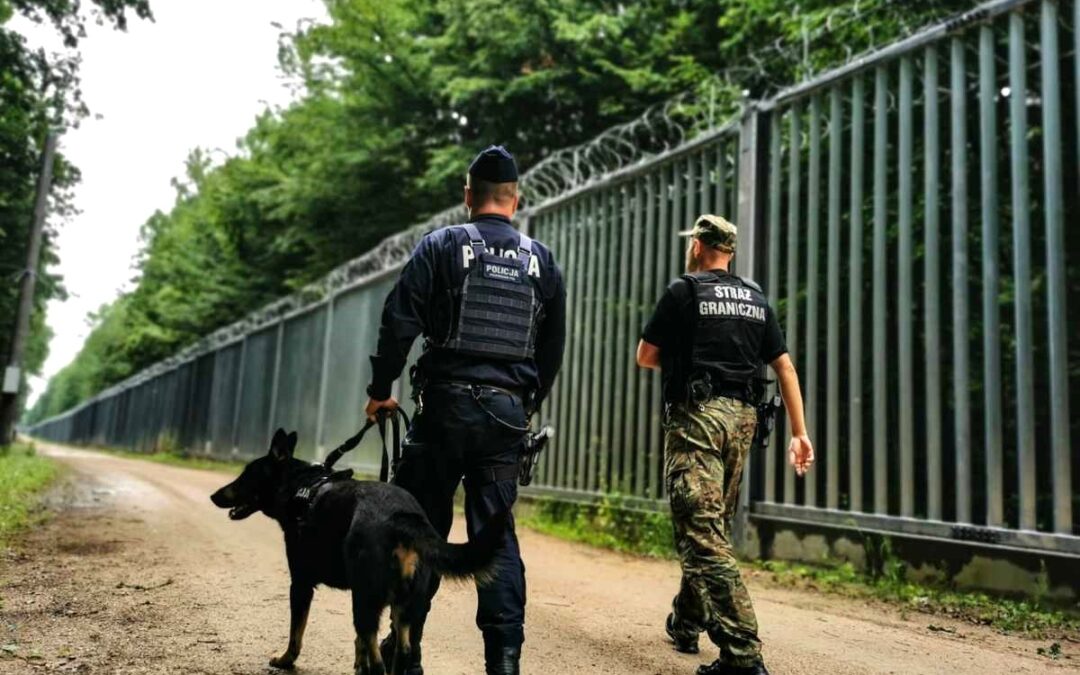Poland has extended its exclusion zone on the Belarus border for a further period of three months. The interior ministry says that the measure has already resulted in a 64% drop in the number of attempted illegal crossings by migrants, who are mainly from the Middle East, Asia and Africa.
The zone was introduced on 13 June in response to a surge in attempted crossings by migrants – who are encouraged and assisted by the Belarusian authorities – as well as a rise in aggression towards Polish border officers, which in one case led to the death of a soldier.
The measure – similar to one previously enacted under the former government in 2021 – bans unauthorised people from coming within 200 metres of the Polish side of the border in some places and up to two kilometres in others. It is intended to ease the work of border officers and to hinder people smugglers.
On Tuesday, the interior ministry announced that, from Wednesday, the exclusion zone would be extended for a second period of 90 days.
Strefa buforowa na granicy z Białorusią przedłużona. Po niemal 90 dniach dotychczasowego jej funkcjonowania liczba prób nielegalnego przekroczenia granicy spadła o 64%, co jest potwierdzeniem zasadności i skuteczności działania strefy https://t.co/inskJ4QVWe
— Jacek Dobrzyński (@JacekDobrzynski) September 10, 2024
“The zone has brought good, concrete results,” said interior minister Tomasz Siemoniak. “It is primarily aimed at people smugglers who pick up individuals being trafficked across the border.”
The ministry notes that, between 13 June and 9 September, the border guard recorded 6,130 attempts to illegally cross the border. That was down by almost two thirds from the 17,030 attempts recorded in the equivalent period before the zone was introduced.
The exclusion zone has been criticised by both Poland’s commissioner for human rights and the Council of Europe’s commissioner for human rights, who say that it impedes access to the area for the media and humanitarian groups.
In its statement on Tuesday, the interior ministry said that, during the first 90 days the zone was in place, the border guard issued 158 permits for people to enter the area, including 97 for representatives of the media and 23 for international NGOs. It has also detained 71 people smugglers during that period.
Sorry to interrupt your reading. The article continues below.

Notes from Poland is run by a small editorial team and published by an independent, non-profit foundation that is funded through donations from our readers. We cannot do what we do without your support.
Earlier this week, the Helsinki Foundation for Human Rights criticised plans to extend the exclusion zone, which they said was “unconstitutional” and would “deepen the rule of law crisis accompanying the humanitarian crisis on the Polish-Belarusian border”.
The decision also comes amid renewed tension with Germany over the issue of illegal migration. Most of those who enter Poland across the Belarus border head further west, in particular to Germany.
In response, Germany last year introduced controls on its borders with Poland and the Czech Republic. This week, Berlin announced that it is now toughening those measures and expanding them to its borders with all neighbouring countries.
Polish Prime Minister Donald Tusk yesterday condemned Germany’s decision as “unacceptable”. He called for Berlin to instead help Poland in its efforts to prevent illegal migration at the EU’s eastern borders.
Polish Prime Minister @donaldtusk has criticised Germany's "unacceptable" decision to reinstate controls on all of its borders.
He says Poland will seek "urgent consultations" at the EU level with other affected countries https://t.co/jvGJng2biN
— Notes from Poland 🇵🇱 (@notesfrompoland) September 10, 2024
Main image credit: Policja Podlaska (under CC BY-NC-ND 3.0 PL)

Daniel Tilles is editor-in-chief of Notes from Poland. He has written on Polish affairs for a wide range of publications, including Foreign Policy, POLITICO Europe, EUobserver and Dziennik Gazeta Prawna.



















